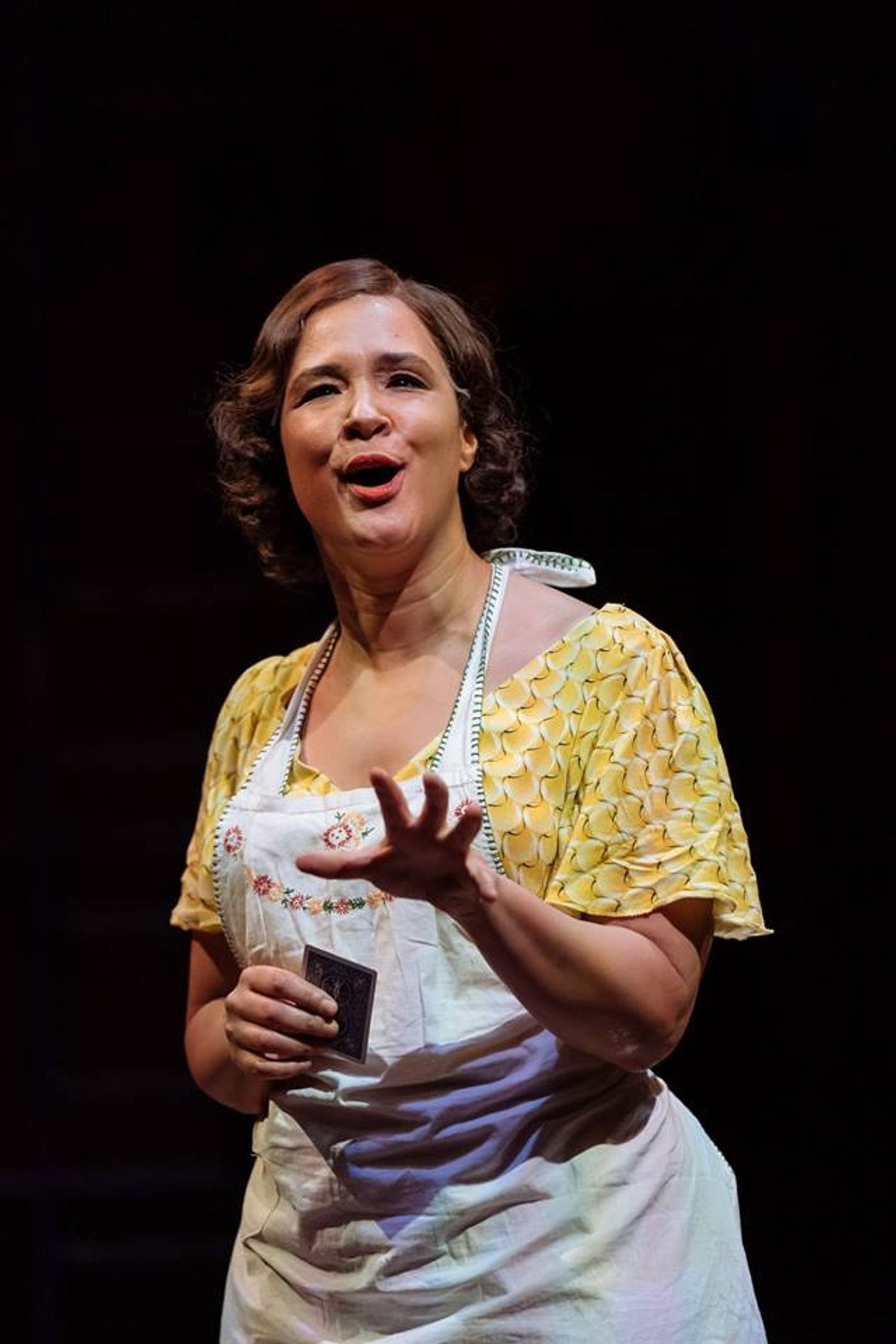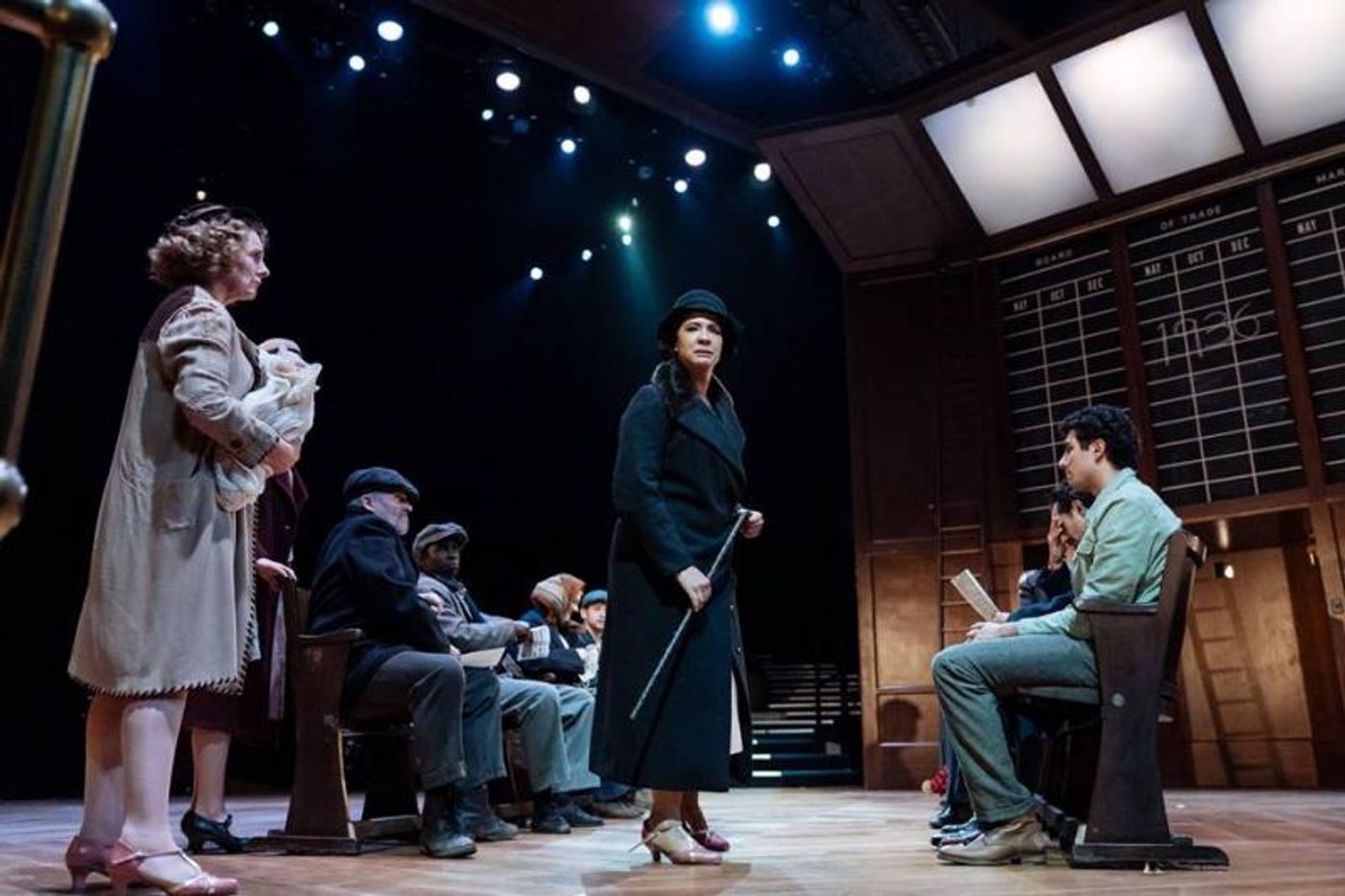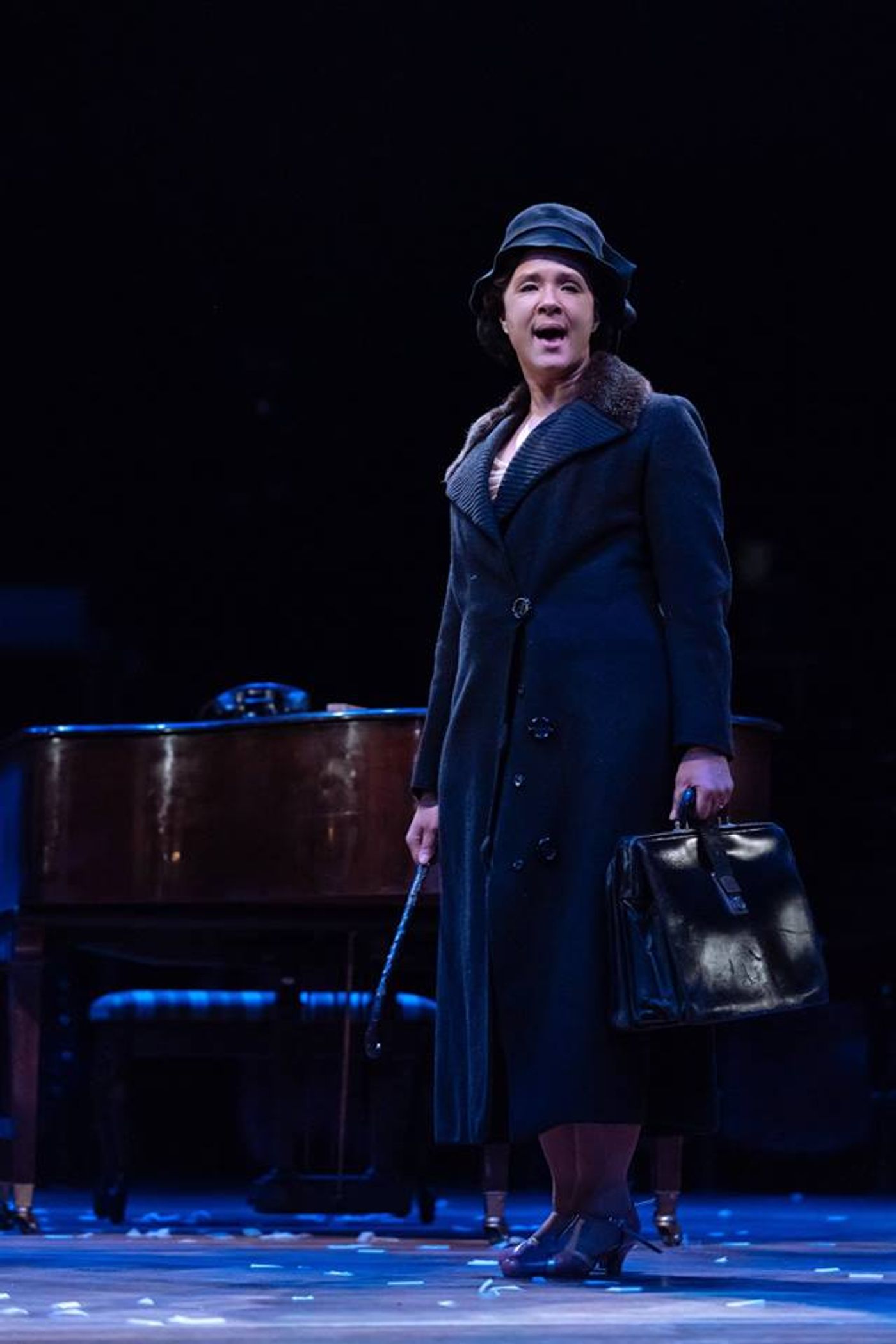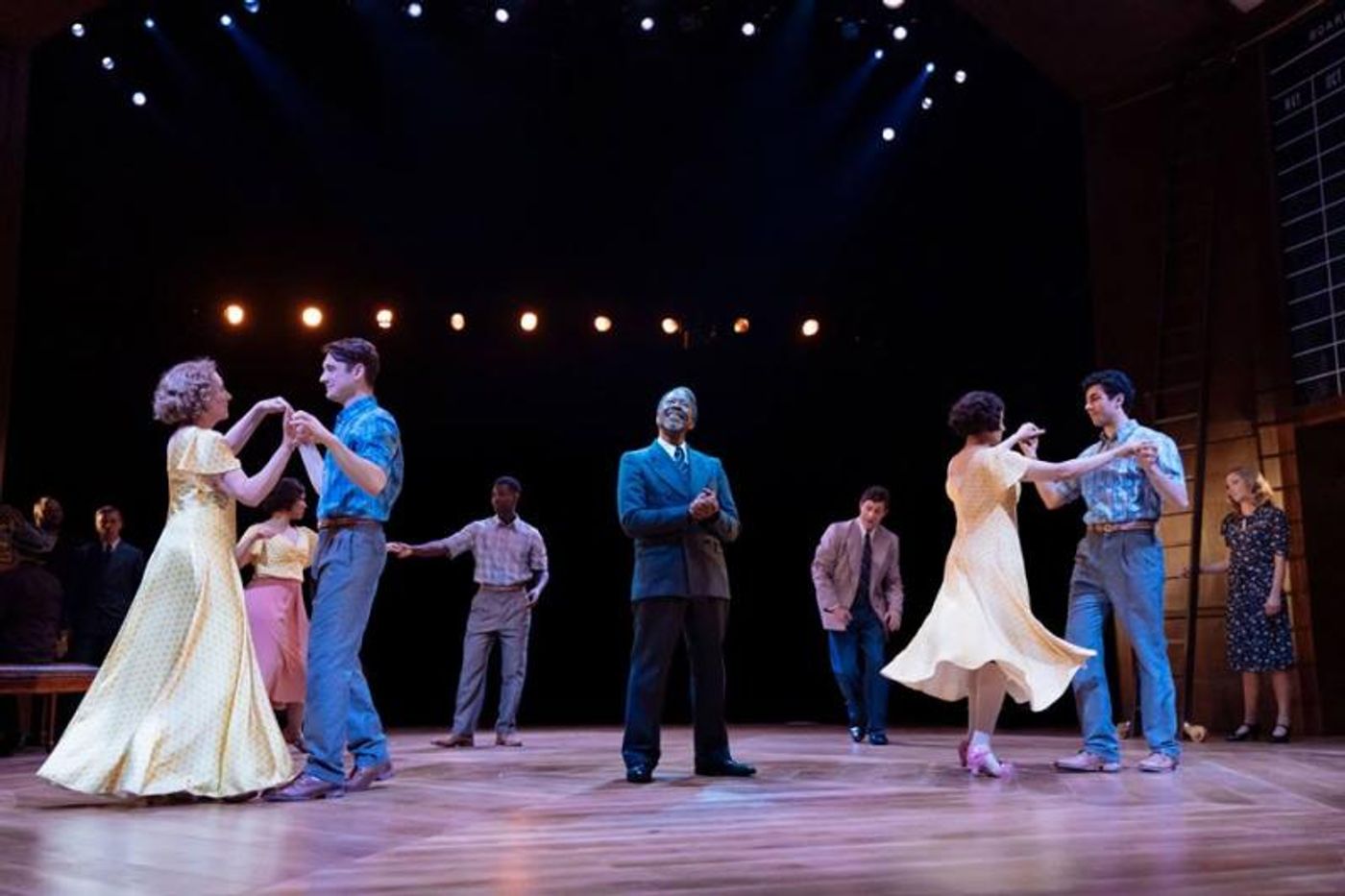Interview: Golda Rosheuvel Talks THE AMERICAN CLOCK

in The American Clock
The Old Vic's double bill of Arthur Miller begins this month, with Rachel Chavkin's production of The American Clock. Telling the history and stories of the Great Depression, the show is set against a jazz soundtrack, sung through and danced to by the cast.
Golda Rosheuvel has always loved this style of music, sharing that "Ella Fitzgerald is one of the reasons [she] started singing". Giving us an insight into the music and magic of the Old Vic, Golda also shares why The American Clock still ticks for every generation, even today.
What's your earliest memory of theatre?
It would be with my family. I come from a very musical family: we've always sung, my father played instruments, my Mum was in an orchestra, my brother too. So it's in the blood, I suppose!
The other thing as well is we read a lot. Mum read me The Secret Garden and she's very good at pulling pictures out of thin air. That storytelling and theatricality and imagining worlds was always there. So there was never really a "I want to do this" moment. It was always an everyday thing.
And it's still your everyday, to this day! You've had such a wonderful last few years in particular...
Absolutely. I mean thinking back to Romeo and Juliet, playing Mercutio at The Globe Theatre, and getting to play her as a woman.
Daniel Kramer was the director, who's a dear friend of mine and we've collaborated on many jobs. We really wanted to explore the character as a woman, because the sexual dynamics would be so interesting between the trio: Romeo, Benvolio and Mercutio. It was thrilling to play, speaking that Queen Mab speech as a woman, it really drew out a lot of sexual complexities and identification.
I mean it's wonderful that those gender swaps are happening now. And I think it's absolutely right. Shakespeare lends itself to that, because of its history of all-male. You know, "Well they did it one way back in the day. Why can't we do it all ways now?"
There's a real opening for people to do that with Shakespeare and really push the boundaries and change the language. Because I don't think he would mind. He was a wordsmith, he created language!
And of course, another gender swap you've got to play this year was Othello at the Liverpool Everyman.
Yes, I've been so lucky.
Similarly with Mercutio though, to play that role...it just had never even occurred to me. When they wanted to see me, I did question it. Not, "Am I capable of doing it?" Because I knew I would be. But is it something that I want to say?
I am a lesbian and out and proud. And I was like, "Okay, this is my lifestyle that I'm putting on stage to people who may not have that accessibility in their lives". And it was like, what do I want to say as a gay woman? How is that being portrayed?
When I was offered the audition, my instincts were that I was going to play her as a woman, and all the pronouns would be changed. And I didn't even have to bring that up because the director Gemma Bodinetz went straight there. So I just knew, if I get this it's going to be alright.
I had such a wonderful time up there. I think as actors, you kind of hope for those roles that push you intellectually, emotionally, physically. I mean I was F-U-C-Ked after that role! It was so fraught with tension and the physical stuff you have to go through, to be jealous and have an epileptic fit every single night.

And it's not just been a year of stage, but also screen.
My Silent Witness just came out and I've lived with that show right from the beginning. It's one of my most favourite British TV shows.
That was a dream come true, plus working opposite Emilia Fox who is just extraordinary and a beautiful human being. That would be another dream of mine, to be a regular in it. I'm going to put that out there into the universe, that's what I would like!
If you say it out loud...
It will be!
You're now in The American Clock at the Old Vic. How familiar were you with the story and history?
I mean I knew Arthur Miller and All My Sons. But I had never come across The American Clock.
I absolutely love the time period, that kind of 1930's music. Like I said earlier, music has always been such a big part of my life. I'm all into jazz, Bessie Smith going through to Nina Simone. Ella Fitzgerald is one of the reasons I started singing. I heard her "A-Tisket, A-Tasket" and was like, "Who is this? I want to do this!"
So I was familiar with the music at that time. But in terms of the crash and everything happening in America around that, not so much. It's been fascinating to discover all that through this piece.
How is that story conveyed to the audience?
Well it is extraordinary what Miller has done with this play: he describes it as a vaudeville piece and it really is. Every kind of moment, every kind of scene is like a snapshot of America at that time.
Right from the Baum family who were these millionaires who lost everything, through to the farmers, and then this tiny scene on the Mississippi river. It has that famous line, "The Depression finally hit the white people. Because us folks never had nothing else".
Those moments are like little photographs. It's like polaroids: they come out and you see the picture coming together as it happens. And Rachel [Chavkin's] beautiful vision links all of those, that journey through. It keeps it tight, fluid, but also theatrical. Because there are some wonderful theatrical moments, but with only two people standing on stage.

in The American Clock
How do you think the show will resonate with audiences today?
I tend not to be political in my life. I'm more political with stuff I do on stage, I'm finding. But I think the uncertainty of our world at the moment really speaks through the play. It spans about five years and you feel the uncertainty throughout.
Some of the stuff that Robertson who Clarke [Peters] is playing says, every generation, there's a clock ticking on every generation. There's a desperateness, the improvising that the world had to do at that time.
You were constantly improvising because there was this uncertainty. You were constantly living in this present of losing everything, but hope, hope, hope something would happen in the future, soon.
The to-ing and fro-ing of that emotional state I think is so relevant today, with America and what's going on here in the next few months.
That uncertainty must be spread across your characters. Can you tell us about who you play?
I play Mrs Baum and Rachel has split that one main family into three families: a white family, an Asian family and a black family. So you see this world through the eyes of a family that shifts through race. I obviously play the mother of the black family and my section is at the end. So you see Rose and her family at their most uncertain, at their most vulnerable.
Then there's my little Mrs Taylor, the wife of a farmer whose farm is taken away from him. She has this tiny monologue about the land, the earth: it was always there and it always gave, but now it's not.
It's so weird that at that time the crash fell, nature started to crash. Because these people couldn't grow their crops. And even if they could, nobody was buying.

And you also play a role with singing too.
Yes! Irene, and she gets "Ain't Nobody's Business" and "Nobody Knows You When You're Down And Out". We meet her at the welfare office and she's kind of an activist. She's a member of the Workers Alliance and she has this wonderful sermon, a monologue where she talks about being at her lowest.
Her husband has passed away, she has no money, and the city marshals come and try to take her stuff away. She explains that she went mad and went down into the streets, shouting and people gathered around here, and the marshal went back into town empty handed.
That galvanised her to do the same for her community: go up and down and preach. Galvanising them to fight for themselves too and get some stability in the community. She says, "It's time to say brother. It's time to ask for help and stop being so proud."
You know, let's march and be with our brothers and sisters. And for me, as Golda, I love all of that.
Finally, what's it like to return to the Old Vic?
This is my fourth show here and I love it. Not only the building, the Front of House, all the staff. But that stage is something really special.
I think here and the Globe are two of my absolute favourite places to play. The reason being they're so epic, not only in their history and physical epicness, but there is also something emotionally intimate about those stages. It can push and pull. You can flex your muscles, but then the stage will cuddle you and support you.
The American Clock at the Old Vic until 30 March
Photo credit: Manuel Harlan

Powered by
|
Videos

